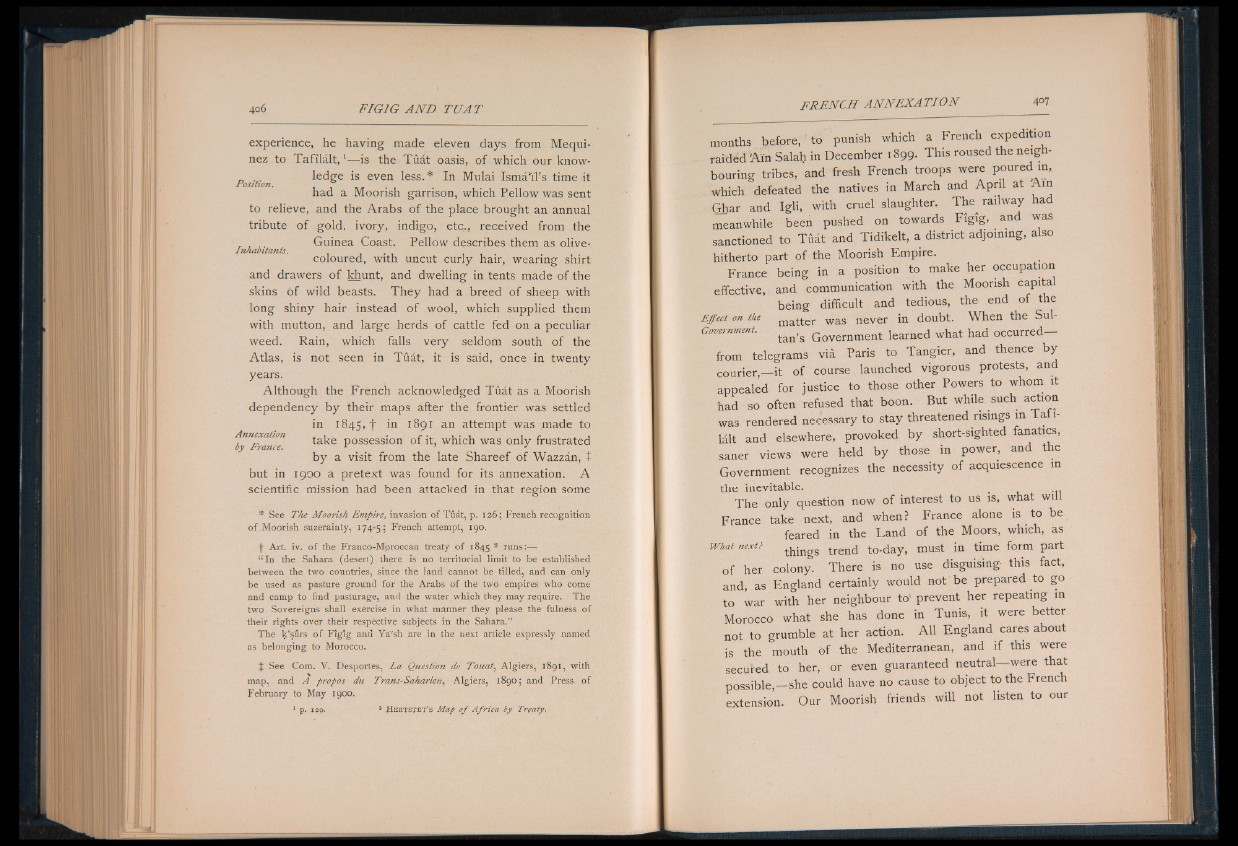
experience, he having made eleven days from Mequinez
to T a fila lt,1— is the Tuat oasis, of which our know-
„ .. ledge is even less. * In Mulai Isma'il’s time it
Eosttion.
had a Moorish garrison, which Pellow was sent
to relieve, and the Arabs o f the place brought an annual
tribute of gold, ivory, indigo, etc., received from the
■ , ,. Guinea Coast. Pellow describes them as olive-
Inhabitants.
coloured, with uncut curly hair, wearing shirt
and drawers o f khunt, and dwelling in tents made of the
skins of wild beasts. They had a breed of sheep with
long shiny hair instead of wool, which supplied them
with mutton, and large herds of cattle fed on a peculiar
weed. Rain, which falls very seldom south of the
Atlas, is not seen in Tuat, it is said, once in twenty
years.
Although the French acknowledged Tuat as a Moorish
dependency by their maps after the frontier was settled
in 1845, f in 1891 an attempt was made to
Annexation take possession of it, which was only frustrated by I ranee. r 1 J
by a visit from the late Shareef of Wazzan, X
but in 1900 a pretext was found for its annexation. A
scientific mission had been attacked in that region some
* See The Moorish Empire, invasion of Tuat, p. 1265 French recognition
of .Moorish suzerainty, 174-5; French attempt, 190.
■f Art. iv. of the Franco-Moroccan treaty of 1845 2 runs a
“ In the Sahara (deseri) there is no territorial limit to be established
between the two countries, since the land cannot be tilled, and can only
be used as pasture ground for the Arabs of the two empires who come
and camp to find pasturage, and the water which they may require. The
two Sovereigns shall exercise in what manner they please the fulness of
their rights over their respective subjects in the Sahara.”
The k’surs of Figig and Yavsh are in the next article expressly named
as belonging to Morocco.
J See Com. V. Desportes, La Question de Touat, Algiers, 1891, with
map, and A propos du Trans-Saharien, Algiers, 1890; and Press of
February to May 1900.
months before,' to punish which a French expedition
raided Ain Salah in December 1899. This roused the neig
bouring tribes, and fresh French troops were poured in,
which defeated the natives in March and April at Ain
Ghar and Igli, with cruel slaughter. The railway had
meanwhile been pushed on towards Figig, and was
sanctioned to Tuat and Tidikelt, a district adjoining, also
hitherto part of the Moorish Empire.
France being in a position to make her occupation
effective, and communication with the Moorish capital
being difficult and tedious, the end of the
Effect on the matter was never in doubt. When the Sul-
Govemment. £a n >g Qovernment learned what had occurred
from telegrams via Paris to Tangier, and thence by
courier,— it of course. launched vigorous protests, and
appealed for justice to those other Powers to whom it
had so often refused that boon. But while such action
was rendered necessary to stay threatened risings in T a filalt
and elsewhere, provoked by short-sighted fanatics,
saner views were held by those in power, and the
Government recognizes the necessity of acquiescence in
the inevitable.
The only question now of interest to us is, what wil
France take next, and when? France alone is to be
feared in the Land of the Moors, which, as
What next? things trend to.day> must in time form part
of her colony. There is no use disguising- this fact,
and, as England certainly would not be prepared to go
to war with her neighbour to' prevent her repeating in
Morocco what she has done in Tunis, it were better
not to grumble at her action. A ll England cares about
is the mouth of the Mediterranean, and if this were
secured to her, or even guaranteed neutral— were that
possible,-she could have no cause to object to the French
extension. Our Moorish friends will not listen to our